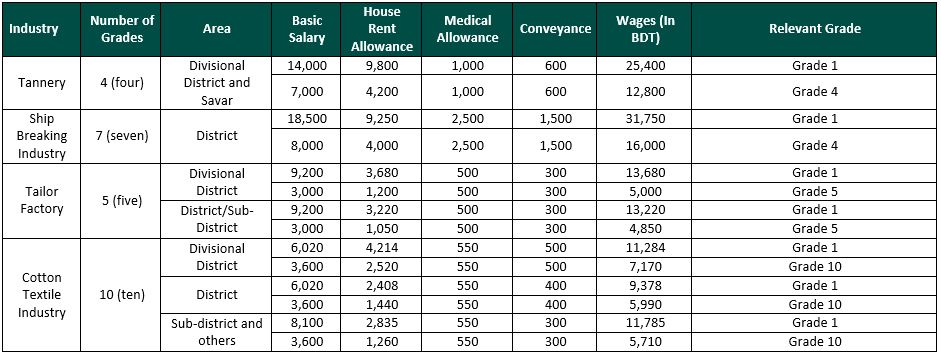Regional Legal Update on Labor and Employment Law Issues
DFDL’s Employment Practice Group is dedicated to advising clients on employment and labor issues and preparing human resources documentation that is compliant with local laws. Our employment team’s in-depth knowledge of the law and practices in the countries where we operate allows us to provide specialized, tailored, and practical advice on issues that arise in employment relationships. Our Head of the Regional Employment Practice Group is Danyel Thomson, who is now based in Bangkok. Danyel has been with DFDL for ten years and previously worked in our Laos and Myanmar offices. This legal update is to advise you on important legislation and employment issues in the region.
This Quarter 2 edition will pay particular attention to minimum wage and data protection developments across ASEAN.
Bangladesh
Minimum Wages Update
The ‘Minimum Wages Board’ (“MWB”) of the Ministry of Labor and Employment (“MOL”) of Bangladesh is responsible for proposing and setting minimum wages for workers employed in different sectors.
Under Section 139 of the Bangladesh Labor Act 2006, the MWB must initially submit a proposal to the MOL with a proposed fixed minimum rate for basic salary, rent allowances, medical allowances, and travelling allowances (“Wages”). If approved, the MOL will publish an official gazette notifying the approved new Wages, which then become applicable to all relevant sector workers.
In 2018, the MOL published the following four approved gazette notifications related to minimum Wages. These were for workers employed under different grades in the tannery industry, tailoring factories, ship breaking, and the cotton textile Industry. The following is a summarized overview of these gazette notifications:
Tannery industry: Under S.R.O. No. 64/2018 dated 27 February 2018 while prescribing the minimum wages ranging from BDT 13,500 to a maximum of BDT 25,400 for Tannery activities situated within divisional districts of Bangladesh, and the minimum prescribed rate for tannery activities situated within other locations ranges from BDT 12,800 to BDT 24,000.
Tailoring factory: Under S.R.O. No. 90/2018 dated 24 March 2018 the minimum wage for workers in a tailoring factory located at any divisional district ranges from BDT 5000 to BDT 13,680, and wages for factories located in districts and sub-districts, will be from BDT 4,850 to BDT 13,220.
Ship breaking industry: Under S.R.O. No. 52/2018 dated 11 February 2018 the minimum wage for workers working in the ship breaking industry ranges from BDT 16,000 to BDT 31,750.
Cotton Textile Industry: Pursuant to the S.R.O. No. 116/2018 dated 3 May 2018 minimum wages have been categorized into three parts namely, based upon the location of the relevant industry, divisional district, district, sub-district and other locations. There are two schedules; for schedule A divisional districts, the minimum wage is BDT 7,170 and a maximum of BDT 11,284. For districts, the minimum wage ranges from BDT 5,990 to BDT 9,378. Moreover, for sub-districts and other locations wages will be BDT 5,710 to BDT 8,977. For schedule B, divisional districts, the minimum wage is between BDT 7,170 to BDT 14,820. For districts, the minimum wage is from BDT 5,990 to BDT 12,290. Finally, for sub-districts and other locations, wages will be from BDT 5,710 to BDT 11,785.
A breakdown of the minimum and maximum wages is provided below:
![]()
Similar to the above, the government has prescribed minimum wages with a detailed breakdown for all workers of all grades. In addition, MWB has submitted their proposed minimum wage for workers in the following sector(s): automobile workshops; bakeries, biscuits and confectionary manufacturing; and the aluminum and enamel industry, subject to approval from the MOL.
Cambodia
Draft Law on Minimum Wage
While the minimum wage is guaranteed under the Labor Law for the purpose of ensuring a decent standard of living compatible with the human dignity of employees, currently there is only a mandatory minimum wage specially determined for workers in the textile, garment, and footwear sectors. Under Prakas No. 396 on the Determination of Minimum Wage for Workers in Textile, Garment and Footwear Sectors for 2018 dated 5 October 2017, a monthly minimum wage for workers in these sectors is USD 165 for probationary workers, and USD 170 for regular workers.
The Ministry of Labor and Vocational Training (“MLVT”) has prepared a draft law on a minimum wage for workers covered by the provisions of the Labor Law (“Draft Law”). According to the latest version available to the public, a tripartite National Council on the Minimum Wage (“NCMW”), comprised of the government, employer representatives, and employee representatives, will be established to conduct studies and research, and provide recommendations for the determination of minimum wage levels and other benefits for persons covered by the Labor Law. Subject to the discretion of the NCMW, key factors to determine the minimum wage include social considerations (such as family status, the inflation rate, and living expenses); and (2) economic considerations (such as productivity, competition, job market status and profitability of the industry). The discussion on minimum wages by the NCMW must be undertaken annually (unless otherwise decided by the NCMW) and in accordance with the procedures as set out in the Draft Law.
Upon the enactment of the Draft Law, based on the NCMW’s recommendation, the minimum wage will be determined by a Prakas (i.e. a ministerial edict) issued by the MLVT and must take effect from 1 January of the year. The MLVT may set the priority of the scope of implementation for minimum wages in accordance with economic activities, profession, occupation, or region based on the economic and social status of the country following receipt of recommendations by the NCMW. Any agreement, whether made verbally or in writing, that provides a minimum wage level lower than that determined by the MLVT, will be null and void.
Following the third public tripartite consultation, the Draft Law was approved by the Council of Ministers on 25 May 2018 and was included on the agenda for discussion at the Permanent Committee of the National Assembly since 29 May 2018. It will then be forwarded to the National Assembly for a full discussion and adoption.
The Lao PDR
Minimum Wage Increase Effective 1 May 2018
The Prime Minister’s Office issued Notification (№ 560/PMO, 20 April 2018) (“Notification 560”) increasing the monthly minimum wage in the Lao PDR from LAK 900,000 (USD 108) to LAK 1.1 million (USD 132). The increase took effect on 1 May 2018, thereby coinciding with International Labor Day celebrations. According to local media and our understanding of the discussions leading up to the announcement, the increase comes in response to the spiraling costs of living and a need to improve the livelihood of workers.
‘Minimum wage’ is not actually defined under Notification 560. However, according to previous legislation, the Instruction on the Amendment of the Minimum Wage of Employees Working in Business Areas (№ 808/MLSW, 9 Feb 2015) (“Instruction 808”), ‘minimum wage’ refers to the minimum amount of salary or wages payable to employees, working up to: 26 days per month; 6 days per week; and 8 hours per day, to guarantee a basic standard of living in the Lao PDR. The minimum wage excludes any other payments which may be due to employees including: overtime payments; bonuses; welfare payments; incentives; and food, lodging, or transportation allowances (if any). For employees who earn wages based on production, the amount paid to such employees may not be lower than the minimum wage then in force.
With regard to the scope of application, Instruction 808 specifically applied to all socio-economic sectors with the notable exception of international organizations, which were regulated separately under the Decree on Management of Local Staff Working for International Organizations in the Lao PDR (No. 456/PM, 1 November 2010) (the “International Organization Staff Decree”). Per this Decree, the monthly minimum wage for local employees of international organizations was higher than that of business sector employees subject to Instruction 808: LAK 1 million (USD 120) for manual labor and LAK 2 million (USD 240) for skilled labor. From our verbal inquiries with the Lao PDR labor authorities, Notification 560 applies to all employers. Indeed, Notification 560 states that the increase is generally for “labor in the Lao PDR”.
Myanmar
Minimum Wage Increase Effective 14 May 2018
The National Committee for setting the Minimum Wage issued Notification 2/2018 establishing an increased daily minimum wage of MMK 4,800 (approximately USD 3.60), for an eight-hour workday. The increased minimum wage does not apply to small businesses with less than ten workers and family businesses.
Notification 2/2018 replaces Notification 2/2015 which established the last daily minimum wage of MMK 3,600 (approximately USD 2.70). The setting of the minimum wage in 2015 adhered to the process established by the 2013 Minimum Wage Law and Rules. The process involves numerous meetings and discussions among the relevant national, regional, and state committees, along with employer and employee organizations, workshops, and other consultations. The previous minimum wage of MMK 3,600 per day did not apply to small businesses with less than 15 employees and family businesses.
Initially proposed in January 2018, an increased minimum wage has been discussed in the manner required by the 2013 Minimum Wage Law in the months since then. Employer and employee organizations have submitted their input, ultimately leading to the issuing of Notification 2/2018. This sets a minimum wage uniformly applicable throughout the country, regardless of work type or location.
Notification 2/2018 is in effect from 14 May 2018.
Singapore*
Upcoming Changes to the Employment Act: A Summary
In a recent parliamentary debate, Manpower Minister Lim Swee Say announced that the Ministry of Manpower (MOM) is planning to remove the salary cap of the Employment Act (Cap 91) (the “Act”) to cover all employees, including all Professionals, Managers, and Executives (PMEs). The Minister also proposed to amend Part IV of the Act to extend additional protection on hours of work and overtime payments to more workers. Should the amendment be approved in parliament, the salary cap for employees (other than workmen) covered by Part IV of the Act will be raised from SGD 2,500 per month to SGD 2,600 by 1 April 2019. Additionally, the method of calculating overtime pay will also be changed for non-workmen employees who earn more than SGD 2,250, but less than SGD 2,600. Lastly, the Minister also proposed to extend the jurisdictional reach of the Employment of Claims Tribunals (ECT) to also hear cases involving wrongful dismissal of employees. Previously, the ECT was only allowed to hear salary-related disputes.
*Submitted by Gateway Law Corporation
Thailand
Workplace Data Privacy: Current Regime and Developments
In Thailand, the basic right to privacy is provided in the Constitution and is recognized and implemented through industry specific legal requirements related to privacy protection and IT security obligations. Examples include the Financial Institution Business Act 2008 and the Telecommunications Business Act 2001. There are several new obligations and offences in the sector-specific rules, rights under the Thai Civil and Commercial Code (“CCC”), and the Thai Penal Code.
In general, workplace privacy violations may be challenged by an injured party as tort actions in accordance with the provisions of the CCC. This is where there is unlawful wrongdoing, unauthorized disclosure, or leaking of personal information thereby causing damages to employees. Under the Thai tort law, employees are burdened with having to prove both causation and the extent of actual damages suffered resulting from the wrongful act in question. This is due to the practice of Thai Courts in determining remedies and compensation based on direct or foreseeable consequences of the wrongful act. Criminal actions on the ground of defamation or illegal disclosure of secrets may be separately pursued. As a form of best practice, employers in Thailand should obtain consent through the use of the employers’ IT system by specifically requesting acceptance from employees with regard to the employer’s privacy and data collection policy (including the acceptance of the use of CCTV monitoring, or monitoring of an employee’s computer usage or online activities) prior to granting him or her a laptop or personal computer.
Current Legal Developments on Data Privacy
On 8 May 2018, the Thai Ministry of Digital Economy and Society released the latest draft of the Personal Data Protection Bill (the “PDPB”). The PDPB’s submission to the Thai Cabinet for approval is still pending. If approved in its current form, the PDPB will come into force one year after being officially published in the Royal Gazette.
In the draft PDPB, the overarching pre-requisite for any kind of personal data collection, usage, or disclosure by data controllers or data processors alike, is consent. The prescribed methods by which consent can be recorded are in writing or through electronic means, unless impossible to do so. To request consent from data subjects, the data controller would be obliged to notify data subjects of the specific purpose for any personal data collection, usage, or disclosure prior to or at the time of collecting such data. Data subjects would be vested with the right to withdraw such consent at any point in time, and the data controller would be obliged to notify the data subject in the case that such withdrawal would materially affect the data subject. A notable exception to the requirement of having to obtain prior consent is data sought per the terms agreed to under a contract or during the performance thereof. Unauthorized personal data collection, usage or disclosure, and associated penalties thereto under the draft PDPB would apply to individuals and juristic persons acting as ‘data controllers’ or ‘data processors’ across Thailand, and potentially abroad.
It remains unclear at this stage as to the extent to which the above requirements regarding the collection, usage, and disclosure of employees’ personal data would apply. Similarly, the draft law is somewhat ambiguous as to the limits to which employers may rely on exceptions to consent in the context of contractual and statutory obligations. The development of the PDPB would be one of the key pieces of legislation to significantly impact business operators, not only from the perspective of internal management of the workforce, but also from the viewpoint of maintaining customer relationships.
Vietnam
Data Protection: Current Framework and Expected Changes
The Current Legal Framework
There is no comprehensive privacy and personal data protection legislation in Vietnam. Instead, various laws deal with different aspects of privacy. These include; the Civil Code, the Law on Credit Institutions, the Law on Protection of Consumers’ Rights, the Law on E-transactions, the Law on Children, the Law on Cyber Information Security, the IT Law, the Law on Telecommunications, Decree 52 on E-commerce, Decree 90 on Anti-spam Activities, and Decree 72 on Internet Services and Online Information. Of note, Vietnam’s Labor Code does not contain specific provisions addressing the protection of personal data of employees. However, employee information such as name, age, salary and other relevant employee information is classified as personal information under Vietnamese law.
Data Subject Consent Requirement
Generally, the Law on Cyber Information Security requires that an individual provide his/her consent before his/her information can be collected for a specific purpose. This personal information can only be used for other purposes if additional consent is sought from the individual to whom the data relates (i.e. the information subject).
The concept of implied consent of the information subject with respect to personal data collection is not recognized under Vietnamese law. As such, unless consent of the information subject has been given or a request from a competent Vietnamese State authority is made to this effect, the processor of information cannot provide, share, or distribute to any third party, personal information of the information subject that it collected, accessed, or controlled by the processor.
Processors of personal information must develop and publicize their methods of processing and their measures for protecting personal information. The processor is also responsible for updating, amending, and destroying personal information upon the request of the information subject. This included destroying personal information when it is no longer required by the processor or if the permitted time period for storing such information has expired, and the information subject must be notified of such destruction.
In term of storage of personal data, there are no specific limitations or restrictions on the period for which an organization may (or must) retain records. However, the organization and individuals collecting, processing, and using personal information may retain this information only for a certain period, as agreed with the information subject.
Data Export Rules
The laws of Vietnam do not provide for clear guidelines on the cross-border transfer of data, in either case where personal data is collected locally or imported but stored locally. However, the following general principles of Vietnamese law need to be considered by data importers and exporters:
-
Data which relates to State secrets can only be exported upon approval by the competent State authority;
-
Acts of disseminating, including exporting prohibited works of press, literature, art, or other publications are prohibited;
-
Acts of disseminating, including exporting falsified or untrue information which is harmful to the lawful rights and interests of organizations and individuals are prohibited;
-
Data that goes against the Socialist Republic of Vietnam and undermines national unity and solidarity may not be collected and/or transferred overseas; and
-
Generally, data which is lawfully collected in Vietnam and does not relate to national security may be transferred out of Vietnam upon consent being provided by the information subject.
Expected Changes under Vietnam’s New Cyber Security Law
Vietnam’s National Assembly recently passed the Law on Cyber Security 2018 on 12 June 2018 which contains certain additional requirements with respect to data protection. The new law requires that foreign organizations: (i) store personal information of users, data on the relationship between service users, and data created by service users in Vietnam; and (ii) in certain cases, to set up a commercial presence in Vietnam in the form of a subsidiary or representative office in order to be entitled to store personal data in Vietnam.
The specific term for the holding of information, the information that must be stored, and the types of foreign organizations that must maintain a commercial presence in Vietnam are to be determined by the Government via regulations that have yet to be enacted. Of note for employers, the new law requires employees who engage in cyber security activities to obtain special training on how to appropriately manage cyber security activities. Again, implementing regulations are still pending which may shed more light on these training requirements.
DFDL Contact
![]()
Danyel Thomson
Head of Regional Employment Practice Group
Danyel.Thomson@dfdl.com
The information provided here is for information purposes only and is not intended to constitute legal advice. Legal advice should be obtained from qualified legal counsel for all specific situations.
Read more Legal & Tax Updates
Read more about DFDL
Read the ASEAN Employment Legal Update 2018 Q.1
The post ASEAN Employment Legal Update 2018 Q.2 appeared first on DFDL.
























